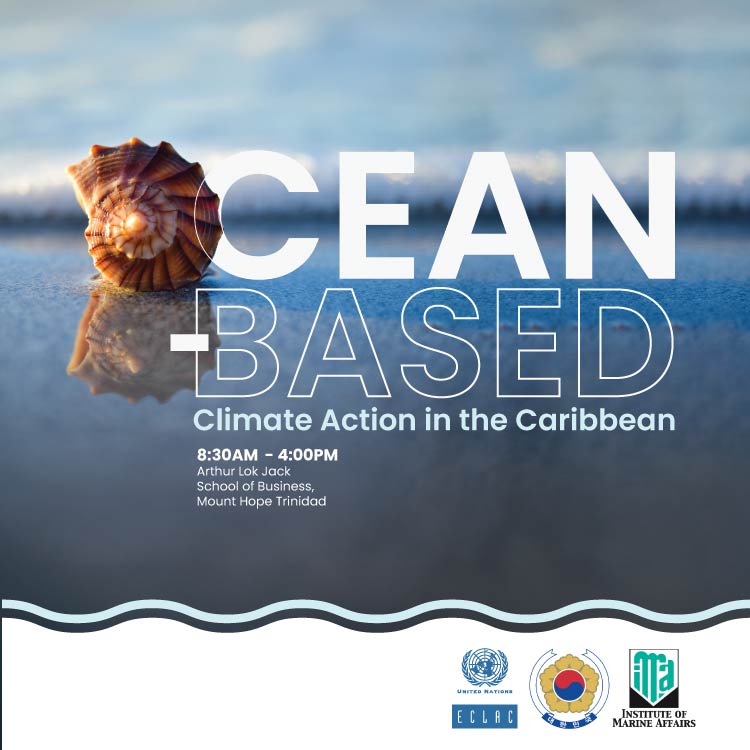Seminar on Ocean-Based Climate Action in the Caribbean
Topic(s)
Teaser
The Embassy of the Republic of Korea in collaboration with the Institute of Marine Affairs (IMA), Ministry of Planning, Economic Affairs and Development of Trinidad and Tobago and the United Nations Economic Commission for Latin America and the Caribbean (ECLAC) Subregional Headquarters for the Caribbean is organizing a seminar on ocean-based climate action in the Caribbean.
Event information

Date
Event type
Participation
The Caribbean Sea and its bordering oceans define the historical, geopolitical, cultural, economic, social, environmental, and future identities of the Caribbean Small Island and Low-Lying Coastal Developing States. With approximately 70% of the Caribbean population residing in coastal areas, the region's economies significantly rely on the Caribbean Sea's resources and ecosystem services. Climate change is further impacting these ocean systems through rising temperatures and sea levels, as well as changes in ocean currents, acidification, coral reef bleaching, salination of freshwater systems, and irreversible loss of biodiversity and ecosystem productivity. These climatic shifts exacerbate extreme weather events, leading to more severe storms, increased flooding, drought, and more frequent and extreme heat waves. The annually recurring influxes of massive Sargasso blooms are also linked to these changes, driven by the complex interactions of altered ocean currents, sea-surface warming temperatures, and increased nutrient availability.
In alignment with global sustainable development imperatives for Small Island Developing States, Caribbean SIDS are strategically prioritizing the evolution of a sustainable ocean-based economy. This paradigm, commonly referred to as the 'Blue Economy', is garnering significant focus across local, regional, and international governance tires. The Caribbean region has identified and is actively cultivating key opportunities within several new and emerging ocean-based industries, including sustainable Mari culture, carbon sequestration, marine biotechnology, and ocean-based renewable energy. These key sectors collectively hold substantial potential to transform traditional ocean-based industries, enhance food and energy security, build greater resilience to the impacts of climate change, promote environmental conservation, and further localize coastal and ocean resources management as an integral component of national sustainable development. This progress is demonstrated in the recently concluded Trinidad and Tobago–United Nations Multicountry Sustainable Development Cooperation Framework (UNMSDCF). The objectives and purpose of the UNMSDCF are to support Trinidad and Tobago in the further fulfillment of the 2030 Agenda and its Sustainable Development Goals. This encompasses enhancing climate change and economic resilience, fostering peace, shared prosperity, and equality.
Building on the outcomes of recent United Nations sustainable development events, this seminar aims to facilitate a dedicated dialogue focused on Caribbean Small Island Developing States. It will seek to promote in-depth discussion, knowledge exchange, and networking strategic priorities and emerging developments in sustainable ocean governance and climate resilience
Practical information
The seminar will be convened on Tuesday 30 September 2025 from 8:30 a.m. – 4:00 p.m. at the Arthur Lok Jack School of Business, Mount Hope Trinidad. This event offers a timely opportunity to explore effective strategies for sustainable ocean governance and climate resilience
Related link(s)
Organizing institution
ECLAC Subregional Headquarters for the Caribbean
- http://www.cepal.org/en/headquarters-and-offices/eclac-caribbean
- (868)224-8000